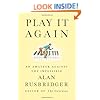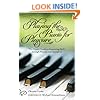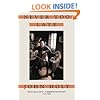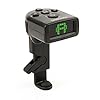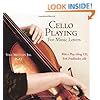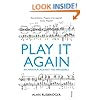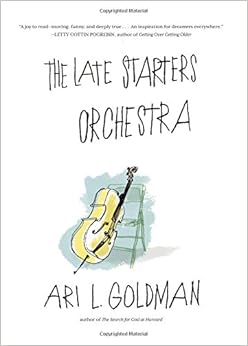



The Late Starters Orchestra Hardcover – June 10, 2014

Don't have a Kindle? Get your Kindle here, or download a FREE Kindle Reading App.
Want to know our Editors' picks for the best books of the month? Browse Best Books of the Month, featuring our favorite new books in more than a dozen categories.
Product Details
Would you like to update product info or give feedback on images?.
|
Editorial Reviews
From Booklist
Review
“More than just a memoir about music and all that it offers; it is also a warm and moving testament to the opportunities of aging.” —Booklist
“The Late Starters Orchestra is a joy to read--moving, funny, and deeply true in its depiction of those aspirations we put aside until, one day, we realize it’s now or never. Ari Goldman’s quest to master the cello is an inspiration for dreamers everywhere.” —Letty Cottin Pogrebin, author of How to Be a Friend to a Friend Who’s Sick
“We’re all living longer. What should we do with the time? Ari Goldman has a solution. The Late Starters Orchestra is warm, soulful, sometimes rueful, sometimes passionate--just like his beloved cello. I found myself laughing out loud in places--and unexpectedly moved at the end.” —Jonathan Weiner, Pulitzer Prize winning author of The Beak of the Finch
“A lovely, moving story of personal rediscovery disguised as a book about cello-playing. Part memoir, part cultural study, The Late Starters Orchestra is is candid, wise, and inspiring, a book a rich and true as an open ‘A.’” —David Hajdu, music critic for The New Republic
“I've long believed that there is a musician hiding in each one of us. Ari Goldman's new book, The Late Starters Orchestra, gives us back our natural right to make music. Goldman's adventure of becoming a cellist is filled with trials, perseverance, humor, and wonderful anecdotes. It's an inspiration!” —Julia Wolfe, co-founder of Bang on a Can
"A poignant and loving meditation on teachers and students, fathers and sons, and the great resilience and capacity of the human brain." —Joshua Henkin, author of The World Without You
More About the Author
Customer Reviews
Most Helpful Customer Reviews
The Late Starters Orchestra has its author, Ari Goldman, getting reacquainted with the cello in his late fifties. He's determined to learn enough to play a few songs for his friends at his 60th birthday party. It's difficult, with his job as journalism professor at Columbia University and a lively family. But he sticks with it, as his old cello teacher, now dead, continues to inspire with remembered words of encouragement.
Since Goldman lives in Manhattan, he has access to many music groups, including entire orchestras made up of amateurs of all levels of experience. He tries a few of them, as well as several music camps both in New York and in England. His experiences are interesting and amusing, as is the fact that his young son took up cello at age six and quickly passed his father. For a while, Ari and his son were able to play in the same beginner's orchestra.
Goldman's struggle to achieve his self-imposed goal is easy to identify with. He also gives us profiles of many of the adult learners he meets along the way. By the time you finish you have to admit, there's no reason not to tackle learning bassoon or Mandarin or how to fly a plane.
Now a professor at the Columbia University Graduate School of Journalism Goldman is a former New York Times reporter who started playing cello in his mid-twenties. He was fortunate in being under the tutelage of a masterful teacher whom he regarded with great affection and came to call Mr. J. He studied with Mr. J. For seven years, and to this day words of guidance and inspiration from his teacher remain in Goldman's mind.
However, as Goldman's career grew and his family expanded he put aside his cello bowing to life's practical economic demands. Yet as time passed his cello was not forgotten and he determined to play again in order to perform at his 60th birthday party. Of course, he is plagued by doubts but soldiers on by securing a new teacher, joining the Late Starters Orchestra of New York City, giving up the gym in order to have more time to practice, securing a seat on his 11-year-old son's youth orchestra, and more.
Along the way he learned many lessons, such as "If you think you can play, you can." and to be confident, "If you look frightened the audience will only feel bad for you." Also included in this memoir are the stories of other members of the Late Starters Orchestra of NYC, why they returned to their particular instrument and what music means to them.
While this is, of course, a story about music and musicians it is a story for everyone reminding us of the great resiliency of the human brain and all the opportunities available to us as we grow older. Mr. Goldman has given us a gift in this wonderful story of personal rediscovery - I would love to hear him play!
Enjoy!
- Gail Cooke
After retirement many people are concerned about how to keep their brains sharp and their lives interesting. Goldman mentions several ways to reduce our brain age, focusing on the incredible power of music. As well, he examines how introducing a young child to music improves their math abilities and stimulates brain growth in specialized areas. Both the old and the young do better in memory tasks than nonmusicians.
Goldman introduces the reader to various amateur music groups including The Late Starters Orchestra. We follow his journey as he sets a personal goal to play exemplary music on the cello on his 60th birthday. On the way, we're introduced to numerous people whose lives have been dramatically improved by returning to our beginning music at a later stage in life, from Dan who lost his job to Geraldine who totes her double bass seven hours by car to participate in an amateur orchestra. Goldman makes it very clear that learning an instrument, especially a stringed one, is challenging and requires commitment and extensive effort at any age but the benefits are worth it.
Goldman reiterates Malcolm Gladwell's statement that 10,000 hours of practice are required to become expert at anything. (If you haven't read Gladwell's books, check them out. They're fascinating sociology/psychology texts.) Goldman admits that no one his age has 10,000 hours and that's okay. Do what you can, where you can, when you can, and it will still make a difference to the quality of your life.Read more ›
